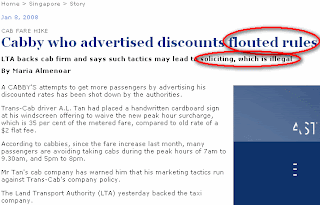Last night (this morning actually), I wrote a post commenting about the article, Discount ads on taxis illegal: LTA, which appeared in the late Monday night (7 Jan) edition of the Straits Times. The sub-header was, “Marketing tactics and soliciting are against company rules and the law“. The ST usually publishes a teaser of a breaking story for the next day’s print edition.

In my blog post, I had questioned how the actions of the taxi driver could have been illegal. He had simply placed a handwritten cardboard sign at his windscreen offering to waive the new peak hour surcharge.
Surprise, surprise….In today’s ST, the headline changed. It now reads “Cabby who advertised discounts flouted rules“. The sub-header is now, “LTA backs cab firm and says such tactics may lead to soliciting, which is illegal” (emphasis mine).
Either:
(a) LTA ordered the ST to make those changes after realising that there was no basis for pronouncing the cabby’s actions illegal, or that the taxi driver was conclusively “soliciting”; or
(b) the ST was irresponsible and untruthful in using the word “illegal” twice when LTA never used it, and implying that the cabby was “soliciting”.
No responsible media or government agency should use the word “illegal” lightly. If what the cabby did was really illegal, then that means he had broken the law and the police should have taken action against him to enforce our much vaunted “rule of law”.
The change should have been marked as a correction with apologies, as is the usual practice with credible newspapers.
In any case, there doesn’t appear to be a hint of contrition for the error on either LTA’s or ST’s part. In today’s article, they were still trying to justify why the cabby’s actions could be illegal, because it “may lead to soliciting”.
In Singapore Law, soliciting usually refers to either unauthorised fundraising by charities, selling sex in a public place or unauthorised street collections. Could some legal eagle please explain to me how placing a sign on your own cab window can be deemed “soliciting”? The taxi driver wasn’t asking for donations, prostituting himself (yucks!!!), or busking with a guitar along the street, was he?
The bottom line is that LTA really had no business pronouncing judgment on this minor infringement of a private company’s rules (if at all). It only serves to confirm in many Singaporeans’ minds that the Government is firmly on the side of taxi companies and not consumers or taxi drivers.
Update:
A friend from SPH sent me this clarification:
STI works independently of the newsroom in that the reporter writes for the print version of the paper. STI takes the draft of the story and puts it up online when it is done. It writes the headline and the summary. Because of the demands of instant news that needs to go out, sometimes the copy may not be perfect and the headline written hastily.
If you read the story, it is exactly the same. In the story, there is no mention of LTA saying that the action was illegal. So the “official and correct” headline is the one you spotted after the fact.
You are right about writing a correction. I have no idea what the policy is for online news. If that had been written in the print headline, for sure ST would have to run a correction. But I suppose they have different rules online.
ST is still trying to converge its newsroom with its online site, so mistakes will be made. Don’t get me wrong, I’m not saying “give them a break”. I think its great that people like you point out the mistakes. Hopefully this will get the attention of the editors and tighten rules around the editorial process.
I have forwarded your blog post to the guy in charge of STI fyi.
